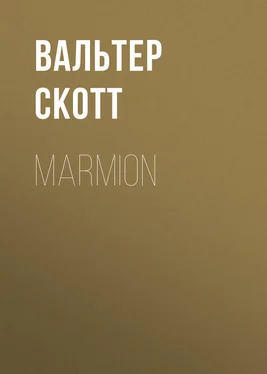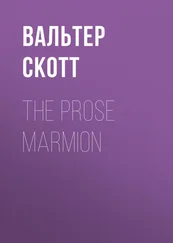Вальтер Скотт - Marmion
Здесь есть возможность читать онлайн «Вальтер Скотт - Marmion» — ознакомительный отрывок электронной книги совершенно бесплатно, а после прочтения отрывка купить полную версию. В некоторых случаях можно слушать аудио, скачать через торрент в формате fb2 и присутствует краткое содержание. Жанр: foreign_antique, foreign_prose, foreign_poetry, на английском языке. Описание произведения, (предисловие) а так же отзывы посетителей доступны на портале библиотеки ЛибКат.
- Название:Marmion
- Автор:
- Жанр:
- Год:неизвестен
- ISBN:нет данных
- Рейтинг книги:5 / 5. Голосов: 1
-
Избранное:Добавить в избранное
- Отзывы:
-
Ваша оценка:
- 100
- 1
- 2
- 3
- 4
- 5
Marmion: краткое содержание, описание и аннотация
Предлагаем к чтению аннотацию, описание, краткое содержание или предисловие (зависит от того, что написал сам автор книги «Marmion»). Если вы не нашли необходимую информацию о книге — напишите в комментариях, мы постараемся отыскать её.
Marmion — читать онлайн ознакомительный отрывок
Ниже представлен текст книги, разбитый по страницам. Система сохранения места последней прочитанной страницы, позволяет с удобством читать онлайн бесплатно книгу «Marmion», без необходимости каждый раз заново искать на чём Вы остановились. Поставьте закладку, и сможете в любой момент перейти на страницу, на которой закончили чтение.
Интервал:
Закладка:
High minds, of native pride and force, 200
Most deeply feel thy pangs, Remorse!
Fear, for their scourge, mean villains have,
Thou art the torturer of the brave!
Yet fatal strength they boast to steel
Their minds to bear the wounds they feel, 205
Even while they writhe beneath the smart
Of civil conflict in the heart.
For soon Lord Marmion raised his head,
And, smiling, to Fitz-Eustace said,
‘Is it not strange, that, as ye sung, 210
Seem’d in mine ear a death-peal rung,
Such as in nunneries they toll
For some departing sister’s soul?
Say, what may this portend?’-
Then first the Palmer silence broke, 215
(The livelong day he had not spoke)
‘The death of a dear friend.’
Marmion, whose steady heart and eye
Ne’er changed in worst extremity;
Marmion, whose soul could scantly brook, 220
Even from his King, a haughty look;
Whose accents of command controll’d,
In camps, the boldest of the bold-
Thought, look, and utterance fail’d him now,
Fall’n was his glance, and flush’d his brow: 225
For either in the tone,
Or something in the Palmer’s look,
So full upon his conscience strook,
That answer he found none.
Thus oft it haps, that when within 230
They shrink at sense of secret sin,
A feather daunts the brave;
A fool’s wild speech confounds the wise,
And proudest princes vail their eyes
Before their meanest slave. 235
Well might he falter! – By his aid
Was Constance Beverley betray’d.
Not that he augur’d of the doom,
Which on the living closed the tomb:
But, tired to hear the desperate maid 240
Threaten by turns, beseech, upbraid;
And wroth, because, in wild despair,
She practised on the life of Clare;
Its fugitive the Church he gave,
Though not a victim, but a slave; 245
And deem’d restraint in convent strange
Would hide her wrongs, and her revenge,
Himself, proud Henry’s favourite peer,
Held Romish thunders idle fear,
Secure his pardon he might hold, 250
For some slight mulct of penance-gold.
Thus judging, he gave secret way,
When the stern priests surprised their prey.
His train but deem’d the favourite page
Was left behind, to spare his age; 255
Or other if they deem’d, none dared
To mutter what he thought and heard:
Woe to the vassal, who durst pry
Into Lord Marmion’s privacy!
His conscience slept-he deem’d her well, 260
And safe secured in yonder cell;
But, waken’d by her favourite lay,
And that strange Palmer’s boding say,
That fell so ominous and drear,
Full on the object of his fear, 265
To aid remorse’s venom’d throes,
Dark tales of convent-vengeance rose;
And Constance, late betray’d and scorn’d,
All lovely on his soul return’d;
Lovely as when, at treacherous call, 270
She left her convent’s peaceful wall,
Crimson’d with shame, with terror mute,
Dreading alike escape, pursuit,
Till love, victorious o’er alarms,
Hid fears and blushes in his arms. 275
‘Alas!’ he thought, ‘how changed that mien!
How changed these timid looks have been,
Since years of guilt, and of disguise,
Have steel’d her brow, and arm’d her eyes!
No more of virgin terror speaks 280
The blood that mantles in her cheeks;
Fierce, and unfeminine, are there,
Frenzy for joy, for grief despair;
And I the cause-for whom were given
Her peace on earth, her hopes in heaven! – 285
Would,’ thought he, as the picture grows,
‘I on its stalk had left the rose!
Oh, why should man’s success remove
The very charms that wake his love! -
Her convent’s peaceful solitude 290
Is now a prison harsh and rude;
And, pent within the narrow cell,
How will her spirit chafe and swell!
How brook the stern monastic laws!
The penance how-and I the cause! – 295
Vigil, and scourge-perchance even worse!’-
And twice he rose to cry, ‘To horse!’
And twice his Sovereign’s mandate came,
Like damp upon a kindling flame;
And twice he thought, ‘Gave I not charge 300
She should be safe, though not at large?
They durst not, for their island, shred
One golden ringlet from her head.’
While thus in Marmion’s bosom strove
Repentance and reviving love, 305
Like whirlwinds, whose contending sway
I’ve seen Loch Vennachar obey,
Their Host the Palmer’s speech had heard,
And, talkative, took up the word:
‘Ay, reverend Pilgrim, you, who stray 310
From Scotland’s simple land away,
To visit realms afar,
Full often learn the art to know
Of future weal, or future woe,
By word, or sign, or star; 315
Yet might a knight his fortune hear,
If, knight-like, he despises fear,
Not far from hence; – if fathers old
Aright our hamlet legend told.’-
These broken words the menials move,
(For marvels still the vulgar love,) 320
And, Marmion giving license cold,
His tale the host thus gladly told: -
The Host’s Tale
‘A Clerk could tell what years have flown
Since Alexander fill’d our throne, 325
(Third monarch of that warlike name,)
And eke the time when here he came
To seek Sir Hugo, then our lord:
A braver never drew a sword;
A wiser never, at the hour 330
Of midnight, spoke the word of power:
The same, whom ancient records call
The founder of the Goblin-Hall.
I would, Sir Knight, your longer stay
Gave you that cavern to survey. 335
Of lofty roof, and ample size,
Beneath the castle deep it lies:
To hew the living rock profound,
The floor to pave, the arch to round,
There never toil’d a mortal arm, 340
It all was wrought by word and charm;
And I have heard my grandsire say,
That the wild clamour and affray
Of those dread artisans of hell,
Who labour’d under Hugo’s spell, 345
Sounded as loud as ocean’s war,
Among the caverns of Dunbar.
‘The King Lord Gifford’s castle sought,
Deep labouring with uncertain thought;
Even then he mustered all his host, 350
To meet upon the western coast;
For Norse and Danish galleys plied
Their oars within the Frith of Clyde.
There floated Haco’s banner trim,
Above Norweyan warriors grim, 355
Savage of heart, and large of limb;
Threatening both continent and isle,
Bute, Arran, Cunninghame, and Kyle.
Lord Gifford, deep beneath the ground,
Heard Alexander’s bugle sound, 360
And tarried not his garb to change,
But, in his wizard habit strange,
Came forth, – a quaint and fearful sight;
His mantle lined with fox-skins white;
His high and wrinkled forehead bore 365
A pointed cap, such as of yore
Clerks say that Pharaoh’s Magi wore:
His shoes were mark’d with cross and spell,
Upon his breast a pentacle;
His zone, of virgin parchment thin, 370
Or, as some tell, of dead man’s skin,
Bore many a planetary sign,
Combust, and retrograde, and trine;
And in his hand he held prepared,
A naked sword without a guard. 375
‘Dire dealings with the fiendish race
Had mark’d strange lines upon his face;
Vigil and fast had worn him grim,
His eyesight dazzled seem’d and dim,
As one unused to upper day; 380
Even his own menials with dismay
Beheld, Sir Knight, the grisly Sire,
In his unwonted wild attire;
Unwonted, for traditions run,
He seldom thus beheld the sun. – 385
“I know,” he said, – his voice was hoarse,
And broken seem’d its hollow force, -
“I know the cause, although untold,
Why the King seeks his vassal’s hold:
Vainly from me my liege would know 390
His kingdom’s future weal or woe;
But yet, if strong his arm and heart,
His courage may do more than art.
Интервал:
Закладка:
Похожие книги на «Marmion»
Представляем Вашему вниманию похожие книги на «Marmion» списком для выбора. Мы отобрали схожую по названию и смыслу литературу в надежде предоставить читателям больше вариантов отыскать новые, интересные, ещё непрочитанные произведения.
Обсуждение, отзывы о книге «Marmion» и просто собственные мнения читателей. Оставьте ваши комментарии, напишите, что Вы думаете о произведении, его смысле или главных героях. Укажите что конкретно понравилось, а что нет, и почему Вы так считаете.












